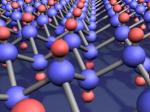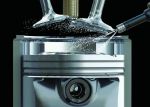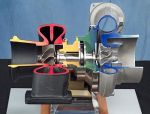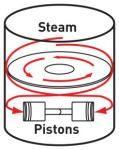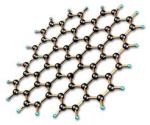 If you scroll down a bit you will see the article “Graphene makes a great superconductor”. In the article the University of Texas found that Graphene has the properties to make a great supercapacitor. But they do not explain how to do it. The process.
If you scroll down a bit you will see the article “Graphene makes a great superconductor”. In the article the University of Texas found that Graphene has the properties to make a great supercapacitor. But they do not explain how to do it. The process.
Well some folks at UCLA have found how the process and it looks pretty straight forward:
http://www.kcet.org/news/rewire/science/more-good-news-on-those-carbon-supercapacitors.html
Here is the Video:
http://vimeo.com/51873011
In the first article they say it can hold as much as a lead acid battery. Lets make the assumption that they are measuring based on space used. In other words you take a lead acid battery and in the volume of space it takes up you can make a capacitor(s) that have the same amount of energy storage. With this in mind I can give some insight. With this capacity your phone and computer will still be Lithium-Ion. LI-On (Lithium-Ion) batteries are light and holds a lot of energy. Just about when you need to replace the battery is about the time you are thinking of getting a new one. So unless they make the capacitor a lot better I can see things staying the same. Even with the capacitors super fast recharge rate.
But for cars and aircraft I see a swift change. Because wight matters. And quick recharge rate matters when dealing with electric cars and Hybrid aircraft. Take the battery in the Chevy Volt. It is quite large. One of the reasons it is so large is they found that if they only charged it 80% and discharged to 30% of battery capacity so it would make the batteries last twice as long. So in effect they are not using all the battery capacity in exchange for longevity. If you swapped out the LI-ON with these capacitors you would still not get as much energy storage but it would take five minutes to recharge. So storage is not such an issue.
The Volt is also fairly complex. The Li-On batteries have to be heated and cooled to keep them working efficiently. I do not think these capacitors would have such issues. Granted extreme weather can cause issues with any system. But batteries being a chemical reaction are effected a great deal by temperature.
For aircraft I see this being an important step also. For planes and helicopters electric motors as the prime mover has advantages in power and simplicity. But the drawbacks right now are too great due to battery weight and loss of efficiency (motors and generators usually have a 10-15% inefficiency). But this could be a turning point. With light weigh capacitors which store the same amount as lead-Acid batteries and have a very long life it may be better to have a aircraft that has one engine for power production, one for backup and batteries which are used for high power demand maneuvers. Like taking off.
Of course this is all speculation at this point. We will have to wait to see what the amp-hours are when they come out with an actual product.
I hope we do not have too long to wait…
Update: 16 August 2013: Another lab is having similer results with Graphene super capacitors. This leads me to belive the breakthrough is not just a process, but the material itself. This is a good thing. No one compnay will be able to lock in this technology. Take a look:
http://www.gizmag.com/graphene-based-supercapacitor/28579/





